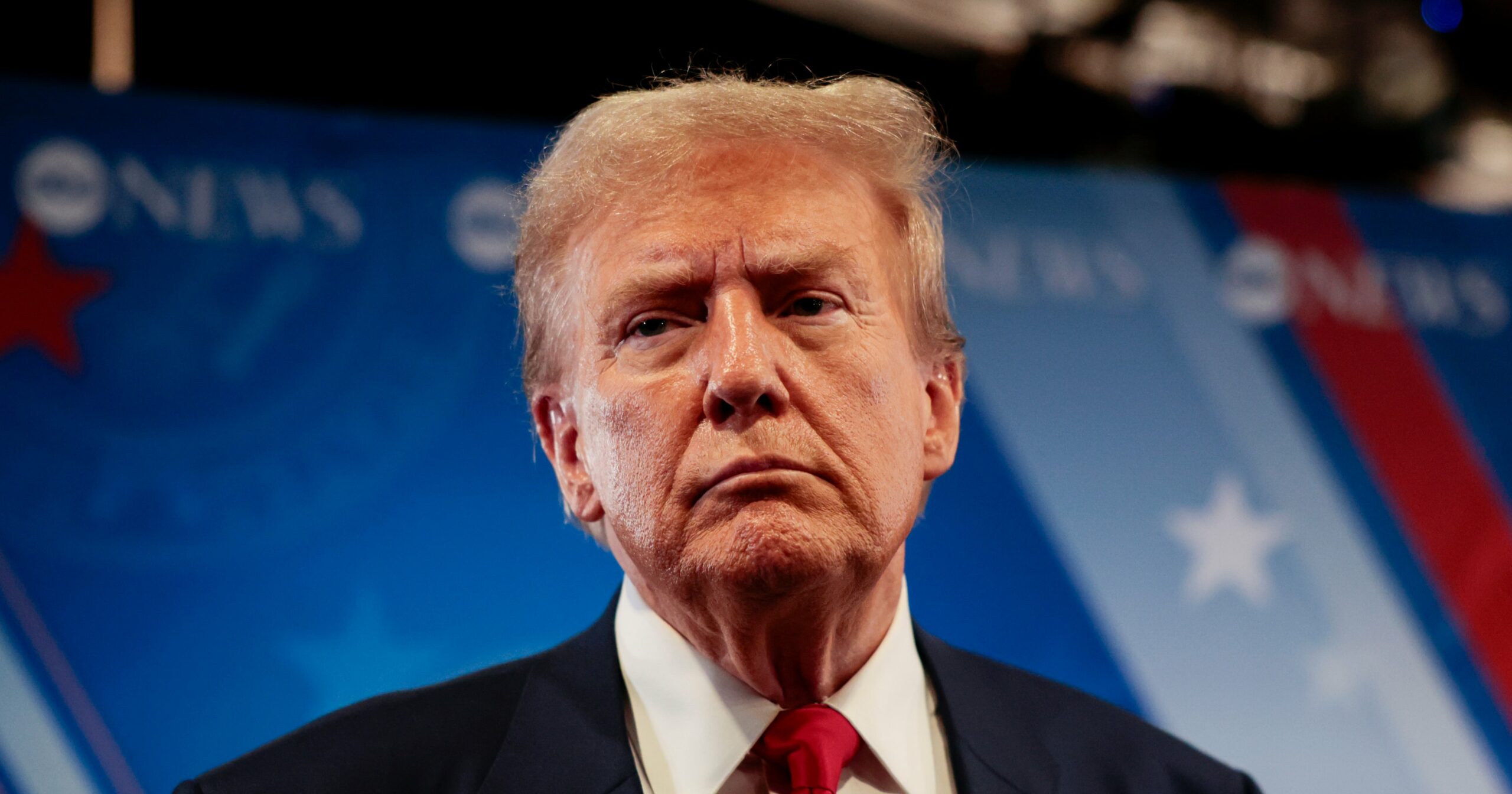After Tuesday night’s debate, in which former president Donald Trump once again relied on fear-mongering and scapegoating immigrants, it’s clear we must confront this dangerous rhetoric head-on. His words don’t just incite hatred – they deeply scar our communities.
Have you ever looked into the eyes of someone desperate to not be seen? There’s a haunting sadness and deep shame in that gaze. It’s a silent plea to remain invisible. Their eyes often lock forward, frozen in fear, before sliding away like a submissive dog before an alpha – powerless and resigned. It’s the look of someone forced to live in the shadows, a look I know all too well. I grew up undocumented, and that same look, etched in my father’s eyes, became my own when words like “illegal” were hurled my way. The term “illegal” is intentionally used to strip away my dignity and reduce my status in the eyes of society.
Whenever someone would accuse or refer to my family and me of being “illegal,” there was a voice inside me that would instantly cry out in terror, “How did they know? Am I in danger?” You could see the trauma in my eyes that hate speech had inflicted on my subconscious mind. For years, it was embedded in my psyche, and for a very long time, it shaped my sense of worth and safety in a world that tells people like me that we don’t belong.
Here’s the truth: we belong here, and we always have. As Latines, our connection to these lands is profound and rooted in an ancestry that predates the founding of this nation. Our heritage is something to be proud of – our stories, sacrifices, and triumphs have helped build and enrich the very foundation of this country. The Latine community is not just a part of America; we are a driving force behind its demographic and economic growth. Our impact is vast, our contributions countless, and our pride in them should be boundless.
Yet, fear-mongering politics continue to weaponize words against us and our communities, not just to divide us but to make us the scapegoats for problems we didn’t create. This tactic isn’t new, but we, and especially as voters, have the power to reshape the narratives scapegoating immigrants. Our most powerful tool in this fight? Our vote. Voting is how we confront hate speech and protect our communities.
A Historical Perspective on Scapegoating
Throughout history, immigrants have often been made into convenient targets during times of social unrest. It’s essential to understand the historical context to grasp the full impact of this highly effective political tactic. Recently, we’ve seen this scapegoating in the portrayal of migrant caravans as threats to American cities, in the labeling of our people as criminals and invaders, and in the enactment of policies designed to limit our presence and economic contributions. Latines wield over $3.4 trillion in spending power, making us the fifth largest global economy in the world right here within our borders, and undocumented immigrants pay more in tax ratesthan the top 1 percent.
To further ground us in historical context, it’s worth noting that before the late 19th century, the concept of “illegal” immigration didn’t even exist in the United States. This changed with the passage of some of the most racist laws in American history, primarily the 1924 Immigration Act, which effectively barred anyone who wasn’t “free and white” from becoming a naturalized citizen. Throughout history, scapegoating and fear-mongering have repeatedly targeted immigrant groups. In the late 19th century, the Chinese Exclusion Act barred Chinese immigrants, fueled by economic fears and racism. The 1840s and 1850s saw Irish immigrants demonized as criminals, while the 1920s Red Scare labeled Eastern Europeans as dangerous radicals.
How Hateful Rhetoric Affects Latine Immigrants
In recent years, the demonization of Latine immigrants has escalated to alarming levels, largely fueled by the divisive rhetoric of political figures like Donald Trump. His speeches, drenched in inflammatory language, have reintroduced terms like “illegal immigrants” into everyday discourse, effectively normalizing hate speech that many of us thought had been left in the past. During Tuesday’s presidential debate, Trump doubled down on his fear-mongering by falsely accusing Haitian immigrants of eating Americans’ pets, orchestrating violent takeovers of buildings, and killing Americans – all extreme, baseless lies aimed at rallying voters through fear. Calling a human being “illegal” is a form of hate speech because it devalues their inherent worth and encourages discrimination, fear, and even violence. This isn’t just rhetoric; it’s a catalyst for real-life negative consequences that impact individuals, families, communitie, and ultimately our society at large.
When Trump and others scapegoat Latine immigrants, they aren’t just stoking a climate of fear and hate – they are laying the groundwork for policies that have devastating effects on our communities. We’ve seen this in the brutal family separations at the border, where children as young as infants were forcibly taken from their parents, creating trauma that will likely last a lifetime.
Under Project 2025, Trump’s vision for a second term includes plans for mass deportations, with proposals to increase ICE’s detention capacity and even use temporary camps to hold detainees. These deportation camps, reminiscent of the most shameful chapters in human history, would be designed to detain hundreds of thousands, if not millions, of people. The trauma and fear this instills in our communities cannot be overstated or ignored.
The resurgence of terms like “illegal immigrants” under Trump’s influence is particularly damaging. These words are designed to dehumanize and marginalize, reinforcing harmful stereotypes and emboldening those who seek to exclude us from the American narrative. We must understand the power of language in shaping public perception and policy-and recognize that this is why our voices and our votes are more crucial than ever. Now is the time to use our vote to stand against hate.
The Power of the Latine Vote
This year, young Latinas have the power to make history. But let’s be clear: potential means nothing if we don’t take action. Voting is the most powerful tool we have to fight back against hate speech and the destructive policies that inevitably accompany it. Many overlook the unique position young Latines hold in this election. As a rapidly growing demographic, particularly in swing states like Arizona and Nevada, we have the numbers to tip the scales in these races.
And yet, too many young Latines still feel disconnected and unsure if their vote really matters. I’m here to tell you: tú voto cuenta. This year, our vote is more critical than ever. With the resurgence of polarizing rhetoric and policies that target our immigrant and Latine communities, the stakes couldn’t be higher. If Trump wins this election, we’re looking at a future filled with normalization of hate speech, mass deportations, family separations, and detention camps.
This isn’t just political; it’s personal. Many of us have families who’ve faced the struggle of starting fresh in a new country, enduring discrimination, and even the threat of deportation. Our gente often didn’t have the privilege of participating in democracy. Voting is how we honor the sacrifices our padres and abuelos made to give us a better life. It’s how we elect leaders who understand our experiences and fight for our needs. Together, we can shift the narrative from fear and exclusion to one of hope and inclusion.
Mi gente, let’s rise to the occasion. Use your voices, use your platforms, and vote to create the change we want to see. Take action: register to vote, know your state’s deadlines, and encourage your loved ones to do the same. Stay informed, volunteer, and join groups that advocate for our communities. Use your social media platforms to raise awareness and combat misinformation targeting our people. And on election day, make sure to vote – every vote counts and yours could be the one that changes everything. Always remember, tú voto cuenta y ¡sí se puede!
Sylvia Banderas Coffinet is a distinguished Latine marketplace expert and C-suite executive with nearly two decades in media strategy and multicultural marketing. A Forbes Trailblazing Latina Executive in Media, she is passionate about amplifying Latine voices and championing diversity in media.




